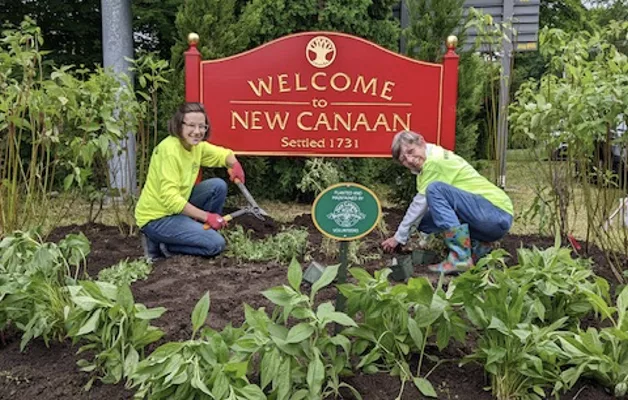By Beth Barhydt
The New Canaan Affordable Housing Committee, under the leadership of Chairman John Goodwin and comprising Krista Neilson, Hilary Ormond, William Parrett, Michael Sweeney, Maria Weingarten, Jane Williams, Jeffrey Williams, and Secretary Christopher Wilson, focuses on increasing affordable housing units while maintaining local control over development. This committee, established by the Affordable Housing Committee Ordinance, is a pivotal entity in New Canaan’s response to the statewide challenge of providing adequate and affordable housing options without sacrificing the town’s unique character and governance.
The committee collaborates with the Housing Authority of the Town of New Canaan and other town bodies to address the affordable housing issue. Their primary goal is to enhance the number of affordable housing units and secure successive moratoria under section 8-30g of the Connecticut General Statutes, which mandates a minimum of 10% of housing stock in towns as “affordable” under a very specific set of definitions.
At the March 11 meeting, key discussions in the committee revolved around developing scenarios to achieve this statutory requirement. These scenarios consider project types, potential use of town property or land acquisition, new project development and maintenance costs, infrastructure impact, funding sources, and taxpayer implications. Town Planner, Sarah Carey and David McCarthy from Heritage Housing discussed the affordable development process and a recap of New Canaan’s affordable projects to date.
Committee members then heard from the town’s attorney, Nick Bamonte for Bercham Moses, about New Canaan’s current 2024 moratorium application and the circumstances around the denial of New Canaan’s 2022 moratorium application. The excess units developed by New Canaan on the Millport Affordable Housing Project, that were not needed towards the town’s first moratorium application, were not permitted by the state to be used towards New Canaan’s second moratorium. This surprised the town’s attorney that submitted the application since the town’s congratulatory letter on the first moratorium from the State even stated New Canaan would be able to use those extra units towards a future moratorium. In addition, the state provided Brookfield a second moratorium allowing excess units to count towards their subsequent moratorium in 2022 and then abruptly reversed its policy and denied New Canaan’s 2022 moratorium application which included the excess Millport units.
The town is currently in litigation seeking relief from the State for not recognizing those remaining excess units. The final decision on that case is expected not sooner than the end of this year. Given the lengthy delay in resolving the case, the committee concurred that the best strategy under the current circumstances is to assume any extra units from both Millport and Canaan Parish projects would not be available for use as the committee works on the town’s strategy to achieve a third moratorium. Meanwhile, the town is expecting to hear a decision from the State on New Canaan’s 2024 Moratorium Application in May, which would provide New Canaan four years of temporary relief from 8-30g projects.
WestCOG’s Executive Director, Francis Pickering discussed affordable initiatives across Fairfield County including nearby communities of Greenwich and Westport. Among the economic challenges to development in the current market is the high cost of the 5 “Ls” land, labor, lending, lumber and laws, which makes any development project much more costly than in the recent past. He stated that other more cost effective alternatives may exist rather than building new, such as purchasing existing naturally occurring affordable housing, rehabilitating the units and deed restricting them or offering residents forgivable 10-year municipal supported renovation loans for home repairs such as mechanicals, which would then require a deed restriction on the properties. Such loans may be counted towards the town’s 10% threshold, but not towards a moratorium. Pickering mentioned that WestCOG will soon make public the results of their study on the alternatives available to Fairfield County Municipalities for affordable development.
In addition, member Maria Weingarten provided a 2024 session legislative update highlighting various bills in the Connecticut legislature impacting local zoning and affordable housing, notably proposals altering zoning laws, housing voucher allocations, and the 2023’s “fair share” Phase 1 bill potentially doubling the affordable housing threshold from 10% to a quota of 20%. Weingarten’s insights illustrated the complex nature of affordable housing issues, emphasizing the need for approaches suited to communities like New Canaan.Weingarten’s update offered a deep dive into several legislative bills under consideration in the Connecticut Legislature, many of which bear significant implications for affordable housing development in New Canaan and the broader Fairfield County region. “The bills we’re tracking,” Weingarten explained, “range from those allowing as-of-right development in areas with existing infrastructure, to proposals that would extend the jurisdiction of outside Housing Authorities like New Haven’s to build in other towns without local consent.”
Highlighting a particular bill that would study eliminating design review in Historic Districts, Weingarten emphasized its potential impact on local zoning autonomy: “This bill proposes as-of-right development, which, if passed, would severely limit local control over development and could fundamentally alter the character of our town.” This sentiment echoes the concerns of some in New Canaan about preserving the town’s unique qualities in the face of potentially sweeping legislative changes.
Weingarten also brought attention to the disparities in housing voucher distribution across Connecticut, noting a critical issue for towns like New Canaan. “It’s disheartening to see the uneven allocation of housing vouchers. Fairfield County, and particularly towns like ours, face unique challenges with higher living and housing costs,” she stated. Weingarten’s critique pointed to the underutilization of vouchers in the state, a situation she described as “a clear indicator of the inequities in our current system.”
Turning to the allocation of state grants and 9% low income housing tax credits (LIHTC), Weingarten criticized the current approach as unfairly biased. “Towns already meeting their 10% affordable housing mandates are often prioritized for these grants, while towns striving to reach this goal are left with minimal support,” she observed. Her insights reveal a systemic issue where legislative and financial resources are not aligned with the towns wanting to build affordable, but lacking adequate financing for projects..
Throughout her update, Weingarten highlighted the urgency for a more equitable distribution of resources and a legislative framework that supports local needs and priorities. “Our town, like many others, needs a fairer allocation of resources to adequately address our housing challenges,” she remarked.
The committee grapples with the challenge of aligning affordable housing development with the town’s character. This endeavor includes managing construction and financing costs, with an understanding that rising expenses are significant obstacles in affordable housing development.
One concern is the town’s capacity to meet the diverse housing demands. The New Canaan Housing Authority’s struggles to fill one-bedroom units at Millport Apartments raise questions about the housing unit types and sizes in demand, underlining the importance of strategic planning in future developments.
To address these challenges, the committee is implementing a multifaceted strategy. Subcommittees on finance and project development, led by Maria Weingarten and Krista Neilson respectively, will investigate solutions and strategies. The finance subcommittee will examine financing models and revenue generation options, while the project development subcommittee will assess potential sites for affordable housing.
Public education and engagement are also critical. Jane Williams leads efforts to inform and involve the community, ensuring transparency and a broad understanding of the issues.


